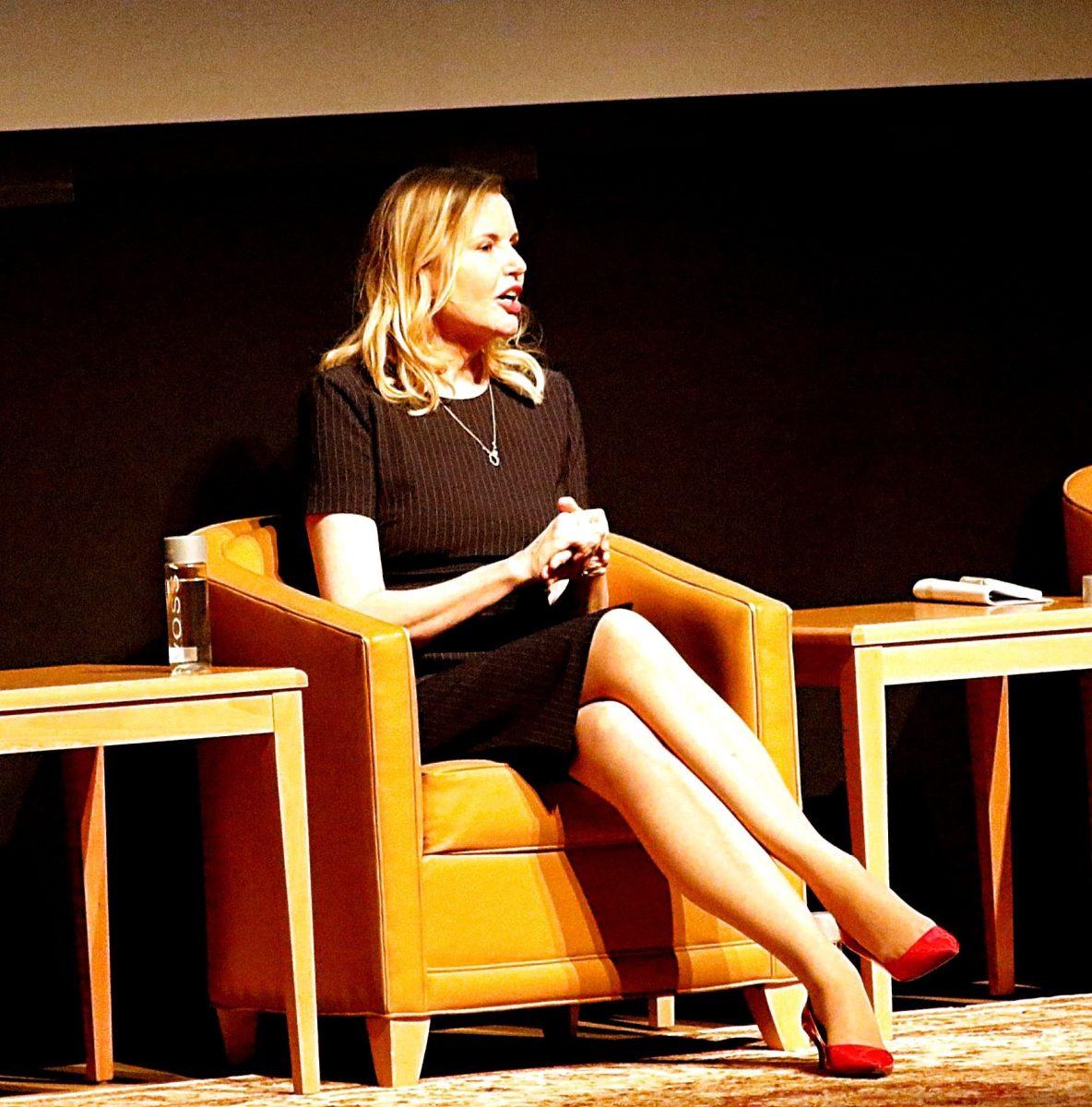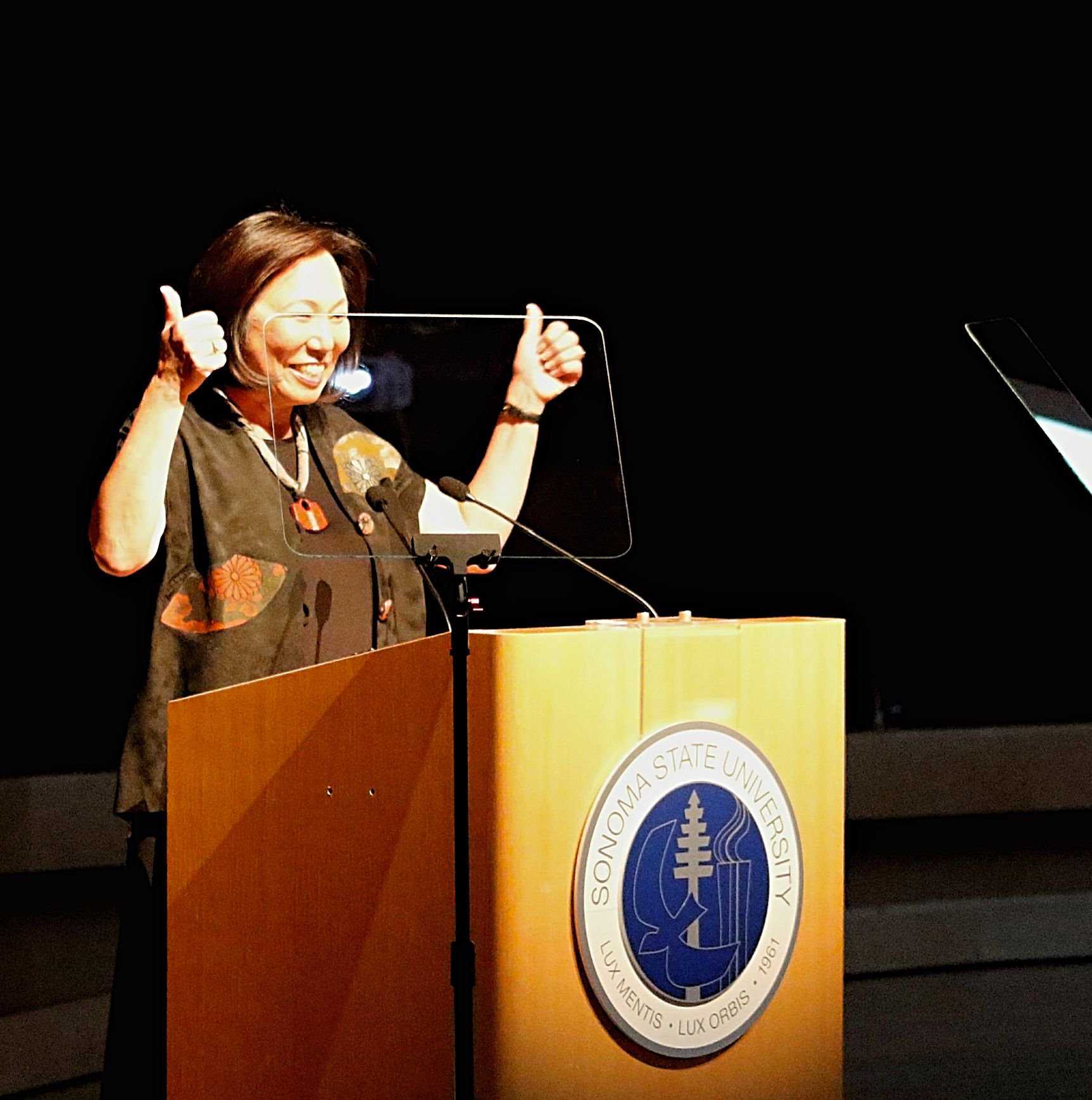Three professional women with diverse backgrounds and careers spoke to a predominantly female audience at the Sonoma County Women in Conversation event on Wednesday, all three receiving standing ovations.
Although different in their journeys and careers, their stories merged with the central message of lifting other women up.
The event was held in Weill Hall at the Green Music Center and featured Sonoma State University President Judy K. Sakaki, Shiza Shahid and Academy Award winning actress Geena Davis as the speakers.
According to Sakaki, her life shifted drastically when her first husband left her and she found herself raising two sons alone.
Sakaki was afraid that her children would lack stability and knew of the poverty that many single mothers faced.
“The terror that I felt at that time remains difficult to describe even decades later,” she said. “After I would tuck them into bed I would cry and cry and cry.”
However, Sakaki said she became a single mother right when the number of single moms was starting to climb.
“According to the U.S. Census Bureau, the second most common family arrangement is children living with a single mother at 23 percent,” Sakaki said. “That means right at this moment single moms are raising more than 17 million of our nation’s kids.”
As a university president and a mother, Sakaki said she values the words of Mary Church Terrell to “lift as you climb.”
Because of this, Sakaki said she works hard in her leadership role in higher education to promote a workplace where single mothers can thrive and create equal access to opportunity to all members of the community.
Sakaki’s journey in higher education and finally reaching her “dream job” as president of Sonoma State cannot be told without telling her journey as a single mother, she said. At the end of her speech she listed all the important roles she identifies as.
“I am Judy Sakaki, university president. I am a leader in higher education. I am a mentor, an advocate, a friend. I am now a grandmother. I am now a wife. I am a single mother,” she said.
Shahid, an entrepreneur, co-founder of the Malala Fund and women’s rights activist, said her passion is educating and lifting others up, especially women. Perhaps the most important girl Shahid ever mentored, she said, was female education activist Malala Yousafzai.
Yousafzai grew up in Pakistan, and as a young girl advocated that all women should receive an education. As an activist, Yousafzai received threats from the Taliban, who shot her in the head in 2012. She survived and went on to win the Nobel Prize in 2014.
“What I could never have imagined was that a little girl who I had begun mentoring would go on six years later to become the youngest ever Nobel Peace prize winner,” Shahid said. “In many ways the impact that we have is catalytic; when we lift up one person we don’t know how many others they enable and power.”
Davis, known for such movies as “A League of Their Own” and “Thelma and Louise,” also spoke about the importance of lifting up others and empowering women. She focused specifically on how to achieve this within the entertainment world.
According to Davis, with most images of women depicted in the media being either stereotyped or hypersexualized, girls have a limited amount of strong and diverse women role models.
“The message is sinking in; the more hours of TV a girl watches the fewer options she thinks she has in life,” Davis said.
According to Davis, her dream is to help create a world where girls can have women role models to look up to on the big screen. In this dream she emphasizes the motto, “If they see it, they can be it.”
She gave concrete examples of this in the film and television industry. She showed how the spike of girls’ participation in archery can be connected with the release of movies such as “The Hunger Games” and “Brave,” whose main female protagonists were archers.
“Media images are extremely powerful, and their impact can be immediate and profound,” Davis said.
After each woman spoke to the audience, all three went back on stage to participate in a conversation and answer questions on topics relevant to all women. A panel of female SSU students asked the questions.
The discussion covered topics such as unspoken rules for women in the workplace, how they overcame obstacles and dealing with insecurity as a woman when challenging social norms.
Sakaki spoke of the obstacle of implicit bias in the professional world. She emphasized the importance of supporting other women, especially in the workplace.
Davis revealed how important growing self-esteem was in her journey to success.
“It’s growing self-esteem and the ability to feel and say what you think. It has been an extraordinary journey, and it’s amazing how long it takes,” Davis said while laughing.
Shahid spoke about her “naturally rebellious” nature she has when challenging norms not only as a women but within her culture.
“As a spoken or unspoken rule that I try to break, is to show up and demand to be included,” Shahid said.
The last question asked at the event was, “Do you see yourself as successful?”
“Yes, I see myself as successful,” Sakaki said. “But I also see with that a lot of responsibility to continue to lift as I climb and to reach together to create a circle to support all the students here.”




































